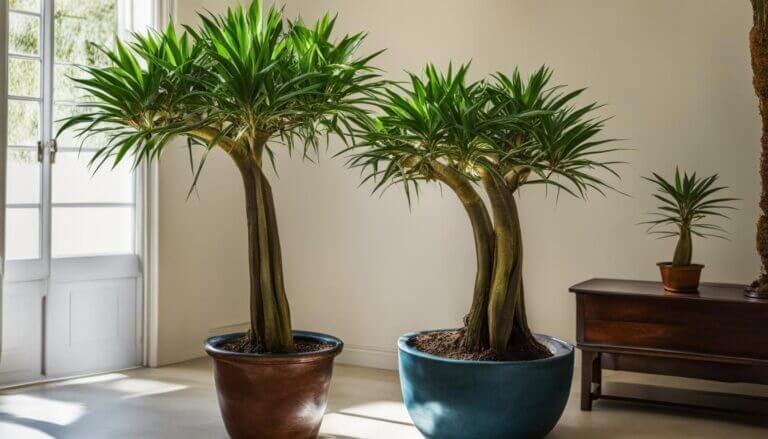Are Cast Iron Plants Safe for Cats and Dogs? Safety Tips for Pets
The good news is that cast iron plants are considered non-toxic to both humans and pets, including cats and dogs. This means that if your pet accidentally chews on a cast iron plant, it is unlikely to cause any serious harm. These plants do not contain any known toxic substances that can cause severe illness or poisoning.
Key Takeaways:
- Cast iron plants, also known as Aspidistra elatior, are considered pet-friendly and non-toxic to cats, dogs, and other pets.
- Although cast iron plants are safe, ingestion may cause mild stomach issues in pets. If symptoms persist, it is best to consult a veterinarian.
- To ensure the safety of your pets, keep cast iron plants out of their reach and place them in areas where they cannot easily be accessed.
- Cast iron plants offer benefits such as low-maintenance care, adaptability to different lighting conditions, and improvement of air quality in pet-friendly homes.
- Caring for cast iron plants involves providing appropriate lighting, avoiding overwatering, and repotting infrequently.
- There are other pet-safe plant options for pet-friendly homes, including spider plants, African violets, bromeliads, Christmas cacti, and specific varieties of succulents.
- Research the toxicity potential of any new plants and consult with a veterinarian for guidance on pet-friendly options.
Cast Iron Plant Toxicity to both humans and pets
The good news is that cast iron plants are considered non-toxic to both humans and pets, including cats and dogs. This means that if your pet accidentally chews on a cast iron plant, it is unlikely to cause any serious harm. These plants do not contain any known toxic substances that can cause severe illness or poisoning.
Mention of mild symptoms like diarrhea or vomiting if consumed by pets
However, it is important to note that even though cast iron plants are non-toxic, some pets may experience mild symptoms if they consume parts of the plant. The most common symptoms include mild diarrhea and vomiting. These symptoms are usually self-limiting and resolve within a couple of hours.
If your pet shows any signs of discomfort, such as prolonged or severe vomiting, diarrhea, or skin irritation, it is best to consult a veterinarian for further advice. They will be able to assess the situation and provide appropriate guidance based on your pet’s specific needs.
To ensure the safety of your pets, it is recommended to keep them away from cast iron plants whenever possible. This can be achieved by placing the plants in areas that are out of reach or by using deterrents to discourage chewing. Regularly monitor your pets when they are near houseplants to prevent any potential incidents.
Safety Tips for Keeping Pets and Cast Iron Plants
Preventive Measures to Ensure Pets Don’t Chew on or Consume Cast Iron Plants
While cast iron plants are considered non-toxic to cats and dogs, it is still important to take certain precautions to ensure the safety of your pets. Here are some preventive measures you can take:
- Educate Yourself: Familiarize yourself with the characteristics and appearance of the cast iron plant. This will help you distinguish it from any potentially harmful plants that may be present in your home.
- Supervise Your Pet: When introducing a new cast iron plant into your home, keep a close eye on your pets to ensure they don’t show excessive interest in the plant. If you notice any attempt to chew or consume the plant, redirect their attention to a safe and appropriate toy or treat.
- Provide Alternative Chewing Options: Pets often chew on plants out of boredom or to fulfill their natural chewing instincts. To prevent them from targeting the cast iron plant, provide them with suitable chew toys and treat-filled puzzle toys to keep them occupied.
- Use Bitter Sprays or Deterrents: If your pet continues to be attracted to the cast iron plant, you can consider using bitter sprays or pet-friendly deterrents. These products have a bitter taste or smell that repels pets, discouraging them from approaching or chewing on the plant.
- Train Your Pet: Use positive reinforcement training techniques to teach your pet not to chew on or approach the cast iron plant. Reward them with treats and praise when they exhibit appropriate behaviors.
Importance of Keeping Plants out of Reach and Using Deterrents if Necessary
Although cast iron plants are generally safe for pets, it is still wise to keep them out of reach to prevent any potential accidents or damage. Here’s why:
- Avoid Accidental Ingestion: Even non-toxic plants can cause gastrointestinal upset if ingested in large quantities. By keeping the cast iron plant out of reach, you minimize the risk of your pet consuming large amounts of the plant material.
- Prevent Plant Damage: Curious pets may knock over indoor plants, potentially causing harm to themselves or damaging the plant and its container. By placing the cast iron plant in a secure location, you reduce the chances of accidents and breakages.
- Protect Your Pet’s Paw Pads: Some cast iron plant containers may have sharp edges if shattered. By keeping the plant out of reach, you prevent your pet from stepping on or coming into contact with these dangerous shards.
Potential Effects of Cast Iron Plants on Pets
Brief explanation of minor stomach issues that pets may experience if they consume cast iron plants
Cast iron plants (Aspidistra elatior) are generally considered safe for cats and dogs. However, if consumed in large quantities, they can cause minor stomach issues such as vomiting, diarrhea, and mild gastrointestinal upset. The exact reason behind these minor stomach issues is not well understood, but it is believed to be due to the plant’s fibrous nature and the presence of certain compounds that may irritate the digestive system.
It is important to note that these minor stomach issues are usually self-limiting and resolve on their own within a few days. Most pets will recover without needing any specific treatment. However, if your pet experiences severe or persistent symptoms, it is recommended to seek veterinary assistance to rule out any other underlying health issues.
Emphasize that serious problems are rare but to seek veterinary assistance if symptoms persist
While serious problems from consuming cast iron plants are rare, it is still important to monitor your pet for any signs of distress and seek veterinary assistance if symptoms persist or worsen. Serious issues such as gastrointestinal obstruction or toxicity are unlikely but not impossible, especially if a large amount of the plant material is ingested.
If you notice any of the following symptoms in your pet after consuming cast iron plants, it is recommended to contact your veterinarian:
- Severe vomiting or diarrhea persisting for more than 24 hours
- Lethargy or weakness
- Loss of appetite or refusal to eat
- Abdominal pain or discomfort
- Excessive drooling or drooling containing blood
- Difficulty breathing
In such cases, your veterinarian may perform a thorough examination and may consider diagnostic tests to determine the underlying cause of your pet’s symptoms. Treatment will depend on the severity of the symptoms and may include supportive care, medications, or other interventions as deemed necessary.
It is important to maintain a safe environment for your pets by keeping cast iron plants out of reach, especially if you have a curious or mischievous pet. By taking preventive measures and monitoring your pets’ behavior, you can reduce the risk of any potential issues and ensure their safety.
FAQ
Are cast iron plants toxic to cats and dogs?
No, cast iron plants are not toxic to cats, dogs, or other pets.
Are there any potential health issues for pets if they chew on or consume cast iron plants?
While cast iron plants are non-toxic, cats and dogs may experience mild stomach issues such as mild diarrhea or vomiting if they chew on or consume the plant.
What should I do if my pet shows symptoms of stomach issues after chewing on or consuming a cast iron plant?
If the symptoms persist for more than a few hours, it’s best to consult a veterinarian for advice.
How can I ensure the safety of my pets and prevent them from reaching the cast iron plants?
To ensure the safety of your pets, it’s recommended to keep cast iron plants out of their reach and place them in areas where they cannot easily be accessed.
What are the benefits of having cast iron plants in pet-friendly homes?
Cast iron plants are low-maintenance, can thrive in various lighting conditions, improve air quality, and provide a calming and aesthetically pleasing environment.
How do I care for cast iron plants in pet-friendly homes?
Cast iron plants require appropriate lighting conditions, such as low light or indirect light, and should not be placed in direct sunlight. They prefer moist soil but do not need excessive amounts of water. It’s best to let the soil dry out between waterings.







